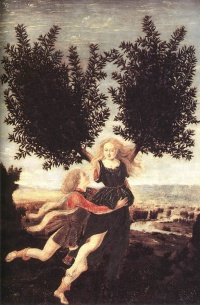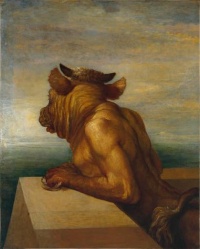Metamorphoses
From The Art and Popular Culture Encyclopedia

|
"Before the ocean and the earth appeared— before the skies had overspread them all— the face of Nature in a vast expanse was naught but Chaos uniformly waste. It was a rude and undeveloped mass, that nothing made except a ponderous weight; and all discordant elements confused, were there congested in a shapeless heap." --Metamorphoses by Ovid, Brookes More translation "Softening quickly in the waters quiet depth, their wood was changed to flesh, the curving prows were metamorphosed into human heads, blades of the oars made feet, the looms were changed to swimming legs, the sides turned human flanks, each keel below the middle of a ship transformed became a spine, the cordage changed to soft hair, and the sail yards changed to arms." --Metamorphoses by Ovid, Brookes More translation |
|
Related e |
|
Featured: |
The Metamorphoses by the Roman poet Ovid is a narrative poem in fifteen books that describes the creation and history of the world. Completed in 8 AD, it has remained one of the most popular works of mythology, being the Classical work best known to medieval writers and thus having a great deal of influence on medieval poetry. It tells of the lives, loves and metamorphoses of Venus, Adonis, Eros, Bacchus, Jupiter, Narcissus and Hermaphroditus and are a continuing influence on mythological painting. the poem's immense popularity in antiquity and the Middle Ages belies the struggle for survival it faced in late antiquity. Considered by Christians a dangerously pagan work, the Metamorphoses was fortunate to survive Christianization, and the vitriolic voices of Augustine and Jerome, who believed the only metamorphosis worth reading about was the transubstantiation.
Contents |
Content
Ovid works his way through his subject matter, often in an apparently arbitrary fashion, by jumping from one transformation tale to another, sometimes retelling what had come to be seen as central events in the world of Greek myth and sometimes straying in odd directions. The poem is often called a mock-epic. It is written in dactylic hexameter, the form of the great heroic and nationalistic epic poems; both those of the ancient tradition (the Iliad and Odyssey) and of Ovid's own day (the Aeneid). It begins with the ritual "invocation of the muse", and makes use of traditional epithets and circumlocutions. But instead of following and extolling the deeds of a human hero, it leaps from story to story with little connection.
The recurring theme, as with nearly all of Ovid's work, is that of love — be that personal love or love personified in the figure of Amor (Cupid). Indeed, the other Roman gods are repeatedly perplexed, humiliated, and made ridiculous by Amor, an otherwise relatively minor god of the pantheon who is the closest thing this mock-epic has to a hero. Apollo comes in for particular ridicule as Ovid shows how irrational love can confound the god of pure reason. The work as a whole inverts the accepted order, elevating humans and human passions while making the gods and their desires and conquests objects of low humor.
Main episodes
- Book I: Cosmogony, Ages of Man, Gigantes, Daphne, Io;
- Book II: Phaëton, Callisto, Jupiter and Europa;
- Book III: Cadmus, Actaeon, Echo et Pentheus;
- Book IV: Pyramus and Thisbe, Perseus and Andromeda.
- Book V: Phineas, the Rape of Proserpina;
- Book VI: Arachne, Niobe, Philomela and Procne;
- Book VII: Medea, Cephalus and Procris;
- Book VIII: Nisos and Scylla, Daedalus and Icarus, Baucis and Philemon;
- Book IX: Heracles, Byblis;
- Book X: Eurydice, Hyacinth, Pygmalion, Adonis, Atalanta, Cyparissus;
- Book XI: Orpheus, Midas, Alcyone and Ceyx;
- Book XII: Iphigeneia, Centaurs, Achilles;
- Book XIII: the Sack of Troy, Aeneas;
- Book XIV: Scylla, Aeneas, Romulus;
- Book XV: Pythagoras, Hippolytus, Aesculapius, Caesar.
Inspirations and adaptations
The story of Coronis and Phoebus Apollo was adapted by Geoffrey Chaucer in the Canterbury Tales, where it forms the basis for the Manciple's tale.
The Metamorphoses was a considerable influence on English playwright William Shakespeare. Shakespeare's Romeo and Juliet is a clear adaptation of the story of Pyramus and Thisbe (Metamorphoses Book 4), and, in A Midsummer Night's Dream, a band of amateur actors performs a play about Pyramus and Thisbe. In Titus Andronicus the story of Lavinia's rape is drawn from Tereus' rape of Philomela, and the text of Metamorphoses is used within the play to enable Titus to interpret his daughter's story. Yet, most tellingly, Shakespeare adapts, with minor changes, a passage from Book 7 of the Golding translation into an important speech in Act V of the Tempest.
- In 1613, Spanish poet Luis de Góngora wrote an illustrious poem titled La Fábula de Polifemo y Galatea that retells the story of Polyphemus, Galatea and Acis found in Book XIII of the Metamorphoses.
- In 1625, sculptor Gian Lorenzo Bernini finished his piece entitled Apollo and Daphne, taken from the episode in Book 1 in which Apollo, pierced by a love-inducing arrow from Cupid, pursues the fleeing nymph Daphne. This episode furthermore has been treated repeatedly in opera, notably by Jacopo Peri (Dafne) in 1597 and Richard Strauss (Daphne, with a libretto that deviates significantly from Ovid's account) in 1938.
- In 1783, Austrian composer Karl Ditters von Dittersdorf wrote twelve symphonies on selected stories of the Metamorphoses; only six survive, corresponding to stories from the first six books.
- In 1951, British composer Benjamin Britten wrote a piece for solo Oboe incorporating six of Ovid's mythical characters.
- In 1988, Author Christoph Ransmayr reworked a great number of characters from The Metamorphoses in his The Last World.
- In 2002, Author Mary Zimmerman adapted some of Ovid's myths into a play by the same title, and the open-air-theatre group London Bubble also adapted it in 2006.
- Naomi Iizuka's Polaroid Stories also bases its format on Metamorphoses, setting the classic play in a modern time with drug-addicted, teenage versions of many of the characters from the original play.
- Acis and Galatea, a masque by Händel, is based on the eponymous characters out of the Metamorphoses, as is Lully's opera Acis et Galatée.
Manuscript tradition
Ovid's Metamorphoses was an immediate success (although Quintilian considered Ovid's tragedy Medea his best work), its popularity threatening that of Virgil's Aeneid. So definitive a work on mythology was it considered that Seneca joked in his Apocolocyntosis that the deification of Claudius should be added to the Metamorphoses. But the poem's immense popularity in antiquity and the Middle Ages belies the struggle for survival it faced in late antiquity. Considered by Christians a dangerously pagan work, the Metamorphoses was fortunate to survive Christianization, and the vitriolic voices of Augustine and Jerome, who believed the only metamorphosis worth reading about was the transubstantiation. Indeed an extremely concise, "inoffensive" prose summary of the poem ("a metamorphosis-free Metamorphoses") manufactured in late antiquity for Christian readers threatened to eclipse the poem itself. Though the Metamorphoses did not suffer the ignominious fate of the Medea, and survived, no ancient scholia on the poem survive (although they did exist in antiquity), and the earliest manuscript is very late, dating from the 11th century.
Collaborative editorial effort has been investigating the various manuscripts of Metamorphoses, some forty-five complete texts or substantial fragments,, all deriving from a Gallic archetype, with the result of several centuries of critical reading is that the poet's meaning is firmly established on the basis of the manuscript tradition or restored by conjecture where the tradition is deficient. The modern critical editions are two: W. S. Anderson's, first published in 1977 in the Teubner series, and R. J. Tarrant's, published in 2004 by the Oxford Clarendon Press.
Translations
Dutch
The Metamorphoses were translated by Carel van Mander in 1604 and later by Vondel (1671).
See also
- Metamorphosis (disambiguation)
- List of characters in Metamorphoses
- Tales from Ovid - Ted Hughes' poetical work
- Metamorphoses (Samuel Garth translation)
- Metamorphoses (Brookes More translation)


